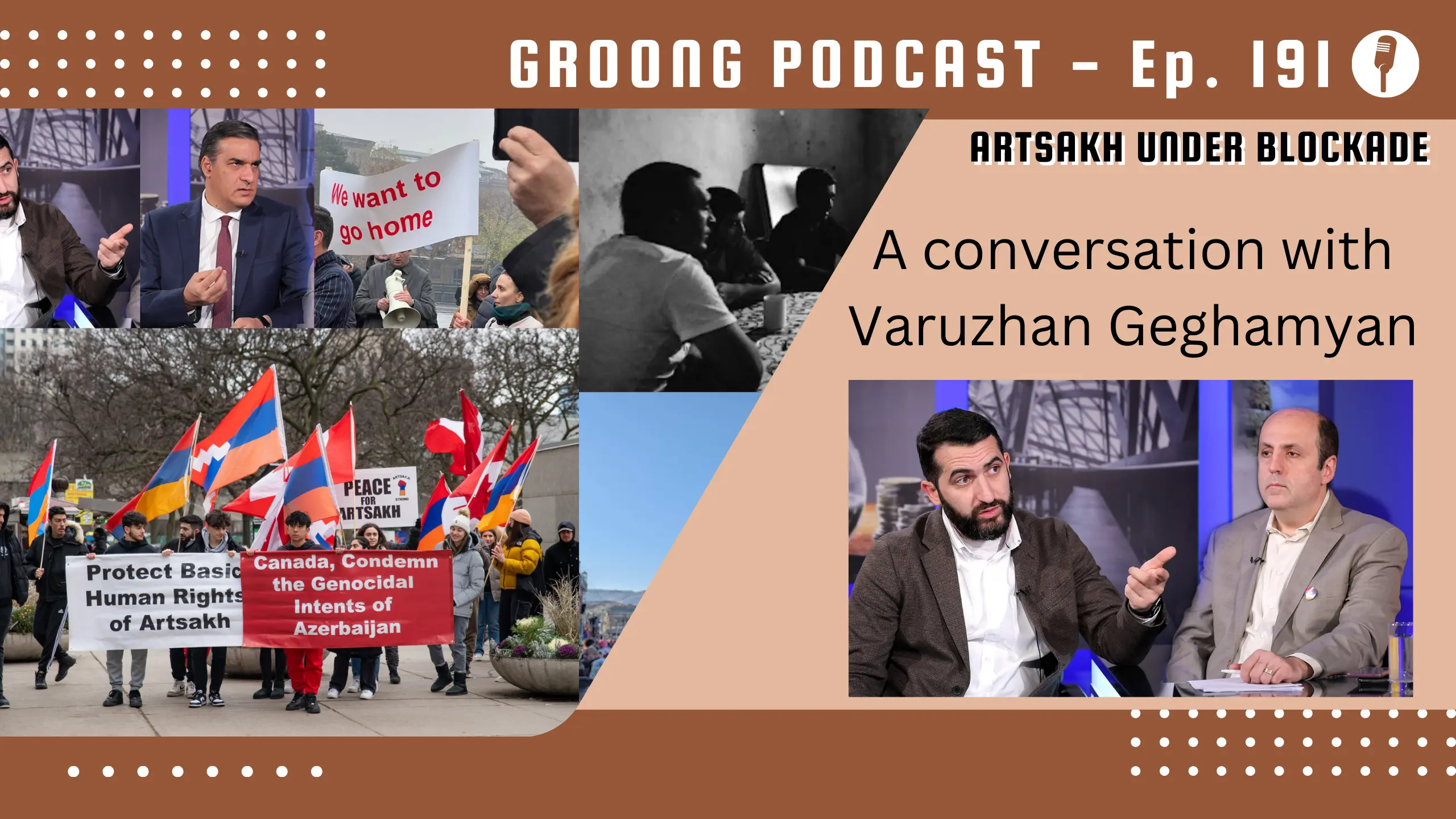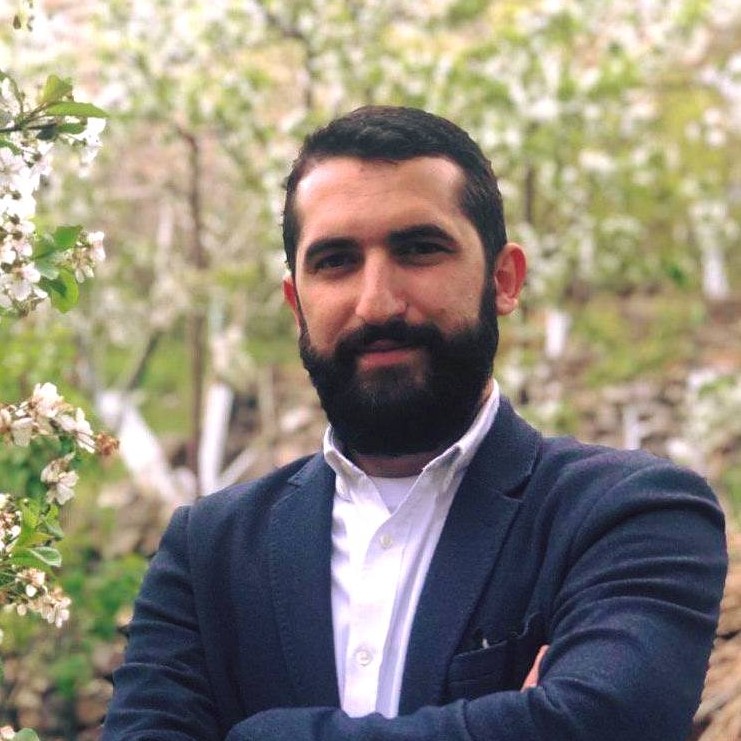
“Turkish threats are going to disappear only when there is no Armenia” - Varuzhan Geghamyan
Guest:
Topic:
- We continue our coverage of the crisis in Artsakh by developments in the UN Security Council as well as Turkish and Iranian concerns in the region.
- More than 120 thousand people, including 30 thousand children, are under siege. Today is the 11th day of the crisis.
- This interview is a continuation of the collaboration between ANN/Groong and 168 Hours aiming to bring you more English-language coverage on the developments of this very serious humanitarian crisis in progress.
Links:
- 168 Hours: https://168.am
- ANN/Groong: https://podcasts.groong.org
Episode 191 | Recorded: December 22, 2022
Show Notes
Show notes
Update on Numbers
As we are recording this discussion, more than 120,000 people remain trapped in the Republic of Artsakh (or Nagorno-Karabakh). For 11 days, Azerbaijan has brazenly blocked all traffic to and from Artsakh, hindering delivery of critical supplies. Yesterday, the International Committee of the Red Cross (ICRC) intervened to transport one cardiac patient to Yerevan. Naturally the Azerbaijani authorities are now cynically using the video of that Red Cross truck crossing the corridor as evidence that they haven’t blocked anything.
Another individual was not so lucky. We were very sad to hear on Monday that one patient died in the hospital in Stepanakert, because it was impossible to get them through the blockade in time, and there are additional patients who are still unable to find proper care.
There’s a lot to say about the humanitarian side of this crisis. Let’s talk for a moment about the politics driving this.
Questions:
- What do you think is the role of the Armenian government in securing the safety of 120,000 of our compatriots in Artsakh?
Internationalization of the Artsakh Cause
On Monday, the United Nations Security Council met at Armenia’s request to discuss the situation in Artsakh. We heard a lot of statements from UNSC members bemoaning the crisis, demanding the reopening of the Lachin corridor, but what we didn’t hear was condemnation of Azerbaijan or resolutions by the UNSC demanding remediation.
One statement, however, drew particular Armenian criticism. Many in Armenia and Artsakh found the Russian statement to be artificially neutral or even pro-Azerbaijani. Specifically, Russia portrayed the blockade as not a violation of the November 9-10 tripartite statement but a mere adjacent issue that is being dealt with. Furthermore, in the eyes of some, Russia downplayed the situation by declaring that the blockade started due to conflicts over mining rights, when Armenians know the final goal of Baku is to appropriate and depopulate Artsakh.
Varuzhan, we know that the Russian peacekeepers have been put in a very precarious position by the Turkish-Azeri alliance, which is taking advantage of a time when Russia is tied up dealing with its war in Ukraine, and needs to play soft with them in order to not open additional fronts in the global Russia-West conflict.
Questions:
- Given the current global “great games”, what is your expectation from the UNSC towards Armenia, if any?
- Do you think the involvement of Russian peacekeepers could drive some western powers to politicize the issue within the UNSC?
- Are Russia’s hands completely tied?
You are of course aware that Richard Moore, the UK spy chief, was in Yerevan and had a discussion with Pashinyan last week.
Questions:
- Why would the chief of MI6 visit Armenia, and why at this time?
The UCHR decision
The European Court of Human Rights on Wednesday ordered Azerbaijan to enable “essential travel” between Artsakh and Armenia.
Questions:
- Same question here: any expectations from court decisions, which have no force function to make these decisions stick? Who would do what, if Azerbaijan simply ignores the decision?
The Role of the Armenian Government.
Let’s talk about the Armenian government’s role for a moment.
A couple of days ago security council secretary Armen Grigoryan claimed that the government, with its activities, is showing that Armenia remains the guarantor of Artsakh’s security, yet at the same time said that the Lachin corridor is the responsibility of the Russian peacekeepers.
Questions:
- Can you help us make sense of these statements?
- How do you assess the Armenian government’s performance in the negotiations with Azerbaijan?
Even if the Armenian government were fully convinced that they have no responsibility beyond whipping and berating the Russian peacekeepers, many analysts agree that closing Lachin is the first step by the Turkish-Azeri alliance towards forcing Armenia to relinquish Artsakh, and then agree to the so-called Zangezur corridor. A recent poll in Azerbaijan reportedly indicates that 63% of Azeris believe that the corridor is essentially a done deal; it will happen.
Questions:
- Some analysts say that Armenia has levers and opportunities that it is choosing not to use. What options does the Pashinyan government have, that it is not exercising?
- Why has Pashinyan and his government washed its hands of Artsakh?
- What should the government be doing that they’re not doing?
- What’s in it for Armenia, if Pashinyan’s math is fulfilled?
At The Precipice of Genocide?
While our government is busy pointing fingers, Azerbaijan is talking about Artsakh, then Zangezur, Sevan, then Yerevan, all without tanks.
According to the Convention on Prevention of Genocide, one of the definitions of Genocide is any activity “deliberately inflicting on the group conditions of life calculated to bring about its physical destruction in whole or in part” against for example an ethnic or national group.
Even Pashinyan has said that Azerbaijan is planning a genocide against Artsakh Armenians. Others say that this is already in progress.
Questions:
- Do you believe that a new genocide of the Armenians is in progress?
- Is there, at this point, the possibility of a positive outcome? How?
Wrap-up
We hope you found our Conversations on Groong helpful, we invite your feedback and your suggestions. You can find us on most social media and podcast platforms. Thanks to Laura Osborn for the music on our podcasts.
Guests

Varuzhan Geghamyan
Prof. Varuzhan Geghamyan is assistant professor at Yerevan State University’s Department of Oriental Studies, teaching courses on Turkey’s modern history, History of Azerbaijan; Sociocultural anthropology of Azerbaijan; Political ideologies and parties in Modern Turkey & History of the Turkish Republic.
Hosts

Hovik Manucharyan
Hovik Manucharyan is an information security engineer who moved from Seattle to Armenia in 2022. He co-founded the ANN/Groong podcast in 2020 and has been a contributor to Groong News since the late 1990s.
Disclaimer: The views expressed by Hovik Manucharyan on the ANN/Groong podcast are his own and do not necessarily reflect the opinions of his employer or any other organization.